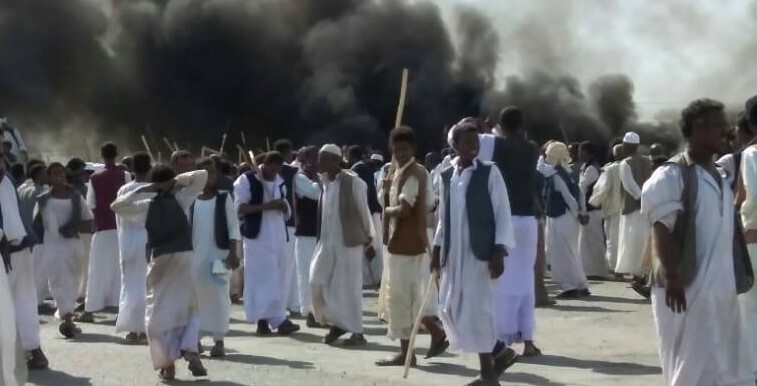On the evening of 15 March, there was an unexpected exchange of gunfire between sections of residents of the Kadugli and Makram neighborhoods in Kassala town of Sudan’s Kassala State.
This incident is the latest in a series of tribal violence episodes spanning from 2020 to 2022, some resulting in severe casualties.
Friday’s clashes left no casualties or injuries and security forces promptly established a security buffer between the two neighbourhoods to contain the situation. However, despite the swift response, official statements from security authorities are still pending, leaving room for conflicting rumors and conjecture to circulate.
Observers warn that the region has become a “ticking time bomb” over the past four years due to escalating hate speech, security vulnerabilities, and an abundance of weapons. Concerns persist about future incidents, exacerbated by the emergence of armed movements like the Front for the Liberation of Eastern Sudan.
Sudanese analysts have delved into the underlying factors and potential consequences of the incident. While no injuries were reported this time, concerns linger regarding the fragility of the region and its susceptibility to further escalation.
Activist Idris Noor, who visited the conflict zone shortly after the outbreak of clashes, recounted that the altercation began when four armed youths entered the Makram suburb. The verbal dispute escalated into gunfire, with the exchange continuing as the group moved into the Kadugli quarter.
A joint force of the army and police intervened after Maghrib prayer, positioning themselves between the two areas and firing warning shots into the air. Noor told Radio Tamazuj that there were no casualties.
“The situation was contained as the suspects who entered Makram were apprehended by the military intelligence before 11 p.m.,” he said.
“I believe that the conflicts in eastern Sudan lack genuine roots because they are not disputes over land, grazing routes, or resources,” he explained.
He argued that all conflicts take on an artificially constructed form, managed by security apparatuses.
“the security forces have a vested interest in preventing tribal conflicts from erupting, as eastern Sudan is now fully under their control,” he emphasized. “All state apparatuses, including the airport and civil transactions, operate from this region.”
Noor stressed that civil conflicts would only arise if the war expanded to eastern Sudan.
Meanwhile, Taher Bashir, a leader of the Sudanese National Alliance Party in the state, sees the recent events in a political light, regardless of their direct causes.
He explained to this publication that violent incidents in Kassala State typically lack clear reasons but fuel tensions between the region’s fragile components.
“Politically, we have noticed that violence often flares up when peace agreements or truces are on the horizon, irrespective of the parties’ differences. Despite the swift intervention and containment of the situation without casualties, we remain wary of renewed clashes, especially during periods of peace negotiations,” he contends. “Incidents may not necessarily recur in the same area but can ignite elsewhere. In eastern Sudan, events are interconnected and conflicts between the same components can erupt in various locations.”
Bashir added: “Often, the primary motives and direct causes of the conflict originate from individuals who are not affiliated with the conflicting groups.”
He said that these conflicts occur in fragile areas, leading to their escalation between these groups, and perpetuating a cycle of violence.
In the same vein, a community activist, Abdul-Ilah Khalifa, noted that without achieving justice for previous incidents and with existing social injustices and animosities between tribal groups, Friday’s events may exacerbate ethnic tensions.
Khalifa shed light on the complex nature of civil conflicts in eastern Sudan, emphasizing their artificial construction and management by elements in the security sector.
He underscored the importance of preventing tribal conflicts from erupting, given the region’s strategic significance to state authorities.
“The ongoing conflict in Sudan is now drawing in and mobilizing tribal groups, either in support or opposition,” Khalifa noted.
He added that the emergence of armed groups, currently training their initial recruits, particularly in neighborhoods like Makram, suggests a potential for renewed conflict under surveillance and readiness for the conflicting parties.
“The continuation of these conflicts is anticipated, especially as these newly trained civilian groups have undergone semi-official training with various heavy and light weapons in light of the instability facing the Sudanese state since 15 April,” Khalifa further explained. “Therefore, the likelihood of more violent and intense incidents than before is significant due to the substantial mobilization of the parties involved.”
The activist personally believes that the recent clashes may not escalate further due to the political dynamics in the region with eastern Sudan serving as a hub for Sudanese affairs and hosting the de facto government headquarters, which is unlikely to allow such a crisis to escalate. He however warns that animosities and irrational actions could potentially push the situation beyond the anticipated framework, as often witnessed in eastern Sudan.




